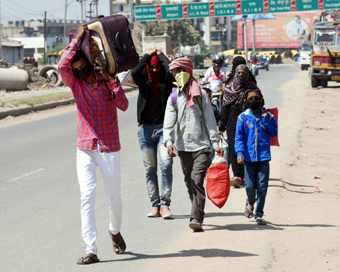 PM Modi visit USA
PM Modi visit USA Only the mirror in my washroom and phone gallery see the crazy me : Sara Khan
Only the mirror in my washroom and phone gallery see the crazy me : Sara Khan Karnataka rain fury: Photos of flooded streets, uprooted trees
Karnataka rain fury: Photos of flooded streets, uprooted trees Cannes 2022: Deepika Padukone stuns at the French Riviera in Sabyasachi outfit
Cannes 2022: Deepika Padukone stuns at the French Riviera in Sabyasachi outfit Ranbir Kapoor And Alia Bhatt's Wedding Pics - Sealed With A Kiss
Ranbir Kapoor And Alia Bhatt's Wedding Pics - Sealed With A Kiss Oscars 2022: Every Academy Award Winner
Oscars 2022: Every Academy Award Winner Shane Warne (1969-2022): Australian cricket legend's life in pictures
Shane Warne (1969-2022): Australian cricket legend's life in pictures Photos: What Russia's invasion of Ukraine looks like on the ground
Photos: What Russia's invasion of Ukraine looks like on the ground Lata Mangeshkar (1929-2022): A pictorial tribute to the 'Nightingale of India'
Lata Mangeshkar (1929-2022): A pictorial tribute to the 'Nightingale of India' PM Modi unveils 216-feet tall Statue of Equality in Hyderabad (PHOTOS)
PM Modi unveils 216-feet tall Statue of Equality in Hyderabad (PHOTOS)The Badminton Association of India (BAI) has announced a 14-member-strong India squad for
- Men’s Sr Hockey Nationals to be played in division-based format from April 4
- Mensik denies Djokovic 100th title in Miami final
- KIPG: Son of a vegetable vendor, Bihar’s Jhandu Kumar eyes Worlds, 2028 Paralympics
- Hardik Singh credits hard work and team unity for receiving HI Midfielder of the Year award
- Djokovic, Alcaraz land in same half of Miami draw
40 cr Indian workers may sink into poverty due to COVID-19: ILO Last Updated : 08 Apr 2020 06:17:42 AM IST 
Patna: Migrant workers leave for their homes amid 21-day nationwide lockdown imposed as a measure to contain the spread of coronavirus, in Patna on March 31, 2020. (Photo: IANS) About 40 crore workers in India working in the informal economy are at risk of falling deeper into poverty during the COVID-19 pandemic crisis.
The International Labour Organisation (ILO) said in a report today that the COVID-19 pandemic is affecting 2.7 billion workers globally due to lockdowns.
COVID-19 is already affecting tens of millions of informal workers. In India, Nigeria and Brazil, the number of workers in the informal economy affected by the lockdown and other containment measures is substantial.
In India, with a share of almost 90 per cent of people working in the informal economy, about 400 million workers or 40 crore in the informal economy are at risk of falling deeper into poverty during the crisis.
ILO said that the current lockdown measures in India, which are at the high end of the University of Oxford's COVID-19 Government Response Stringency Index, have impacted these workers significantly, forcing many of them to return to rural areas.
The report said that particularly in low- and middle-income countries, hard-hit sectors have a high proportion of workers in informal employment and workers with limited access to health services and social protection. Without appropriate policy measures, workers face a high risk of falling into poverty and will experience greater challenges in regaining their livelihoods during the recovery period.
ILO noted that the COVID-19 pandemic has further accelerated in terms of intensity and expanded its global reach. Full or partial lockdown measures are now affecting almost 2.7 billion workers, representing around 81 per cent of the world's workforce.
Employment contraction has already begun on a large (often unprecedented) scale in many countries. In the absence of other data, changes in working hours, which reflect both layoffs and other temporary reductions in working time, give a better picture about the dire reality of the current labour market situation.
Using this approach, as of 1 April 2020, the ILO's new global estimates indicate that working hours will decline by 6.7 per cent in the second quarter of 2020, which is equivalent to 195 million full-time workers.
The majority of job losses and declining working hours will occur in hardest-hit sectors. The ILO estimates that 1.25 billion workers, representing almost 38 per cent of the global workforce, are employed in sectors that are now facing a severe decline in output and a high risk of workforce displacement.
Key sectors include retail trade, accommodation and food services, and manufacturing. Workplace closures have increased so rapidly in recent weeks that 81 per cent of the global workforce lives in countries with mandatory or recommended closures.
Employment in countries with mandatory or recommended workplace closures represents 87 per cent of the workforce of upper-middle-income countries and 70 per cent of the workforce in high income countries.
COVID-19 is now also impacting the developing world, where capacities and resources are severely constrained. Through the massive economic disruption, the COVID-19 crisis is affecting the world's workforce of 3.3 billion.IANS Geneva For Latest Updates Please-
Join us on
Follow us on








172.31.16.186







